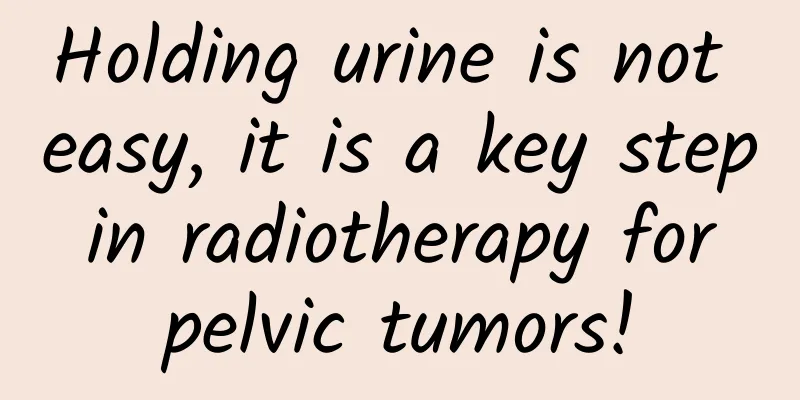Holding urine is not easy, it is a key step in radiotherapy for pelvic tumors!

|
Author: Wang Yijun, Peking Union Medical College Hospital Reviewer: Sun Xiansong, deputy chief technician, Peking Union Medical College Hospital At present, radiotherapy has become one of the important means of treating malignant tumors. Some patients with pelvic tumors may need radiotherapy at a certain period of disease treatment. In the process of radiotherapy for pelvic tumors, patients are usually required to hold their urine before positioning CT scans and radiotherapy. This seemingly simple requirement troubles many patients. Why do you have to hold your urine? What are the consequences of not holding your urine? What are the methods of holding urine? How much urine is appropriate to hold? They have deep doubts about these questions. Today, let's take a look at the problem of holding urine in patients undergoing radiotherapy for pelvic tumors. Figure 1 Copyright image, no permission to reprint 1. Which pelvic tumor patients need to hold urine during radiotherapy? For patients with pelvic tumors such as rectal cancer, cervical cancer, endometrial cancer, prostate cancer, and bladder cancer, during radiotherapy, in order to reduce the radiation dose to the bladder and intestines and alleviate the toxic and side effects of radiotherapy, they usually need to hold their urine before the positioning CT scan and before radiotherapy. Figure 2 Copyright image, no permission to reprint 2. The purpose of holding urine 1. Ensure the accuracy of treatment position During the treatment, the amount of urine held each time should be as close as possible to that held during the first positioning to ensure that the positions of the organs in the pelvic cavity are the same, thereby ensuring the accuracy of radiotherapy. 2. Protect normal tissues and reduce toxic and side effects of radiotherapy During radiotherapy, the radiation not only kills tumor cells, but also harms normal tissues around the irradiated area. For example, the intestines are very sensitive to radiation and cannot tolerate it. Damage to the intestines after irradiation is also the most common toxic and side effect, such as diarrhea, changes in bowel habits, and blood in the stool after radiotherapy. The bladder after holding urine is actually a "big water ball", which can reduce the volume of the bladder itself that is irradiated. In addition, when this "water ball" is filled, it can squeeze the intestines to other locations away from the irradiated area, thereby reducing the irradiation of the intestines and ultimately reducing the toxic and side effects of the intestines. Figure 3 Copyright image, no permission to reprint 3. Consequences of failing to hold urine During radiotherapy for pelvic tumors that requires urine retention, if the patient fails to do so, the radiation dose to the bladder and intestines will increase significantly, resulting in symptoms of acute/chronic radiation cystitis such as frequent urination, urgency, pain, and even hematuria, bladder contracture, as well as symptoms of acute/chronic radiation enteritis such as diarrhea, changes in bowel habits, blood in the stool, and intestinal stenosis. Severe cases require surgical treatment. 4. How to hold urine correctly Under normal circumstances, patients are advised to empty their bowels and bladder before positioning or radiotherapy, drink a certain amount of water in advance according to their personal situation, and remember the drinking time. A certain period of time after drinking water, according to the patient's subjective feeling (such as the feeling of urination, the feeling of urination when pressing the upper edge of the pubic symphysis), CT scanning or radiotherapy can be performed. Patients are generally advised to drink about 1000 ml of water, which can be replaced by an equal amount of tea or beverages. Try to finish drinking water within 20 minutes each time. Generally, the time of holding urine is calculated from the beginning of drinking water, and treatment will be started after 1 hour. During this process, try to avoid drinking water on your own to prevent the regularity of holding urine from being affected. When you drink water until you feel the urge to urinate, you can undergo CT positioning or radiotherapy. It should be emphasized that because the radiotherapy process still takes about 10 minutes, you must not hold it until you have a strong urge to go to the toilet before receiving treatment. If the bladder can hold urine well, the treatment location can be more accurate, toxic and side effects can be less, and the effect of radiotherapy will be better. |
>>: Don’t let aging steal your life! Unlock the health code of old age frailty
Recommend
What's the matter with a girl not seeing red for the first time?
Although most people no longer have the so-called...
Both ovaries are normal in size
In fact, every woman should go to the hospital re...
Melatonin: Born in the night, the correct way to use it is like this
Have you ever had a similar experience: after put...
What should I do if I have anal pain during menstruation?
To put it simply, menstruation is vaginal bleedin...
Traditional Chinese medicine vaginal tightening method
Loose genitals are one of the most influential fa...
What should I do if my baby sneezes and has a runny nose?
Once winter comes, babies will easily catch a col...
What is the best way to stick tiles when they fall off? What mop is good and clean for mopping tiles?
Sometimes life can bring us "little surprise...
Can I get pregnant with adenomyosis?
Adenomyosis is a gynecological disease that does ...
What are the breast health tips?
I believe everyone knows the importance of breast...
Can I drink turtle soup during confinement?
After giving birth, women are physically and ment...
How to treat breast lumps?
Women often have lumps in their breasts. Don'...
What to eat if the vagina is itchy and has bloodshot eyes
With the arrival of hot summer, women will always...
Female chest pain
In daily life, many people experience unexplained...
What should I pay attention to when I just got an IUD inserted?
Nowadays, there are more and more birth control a...
Is it normal to have menstruation 50 days after giving birth?
Women will have lochia after giving birth, whethe...









